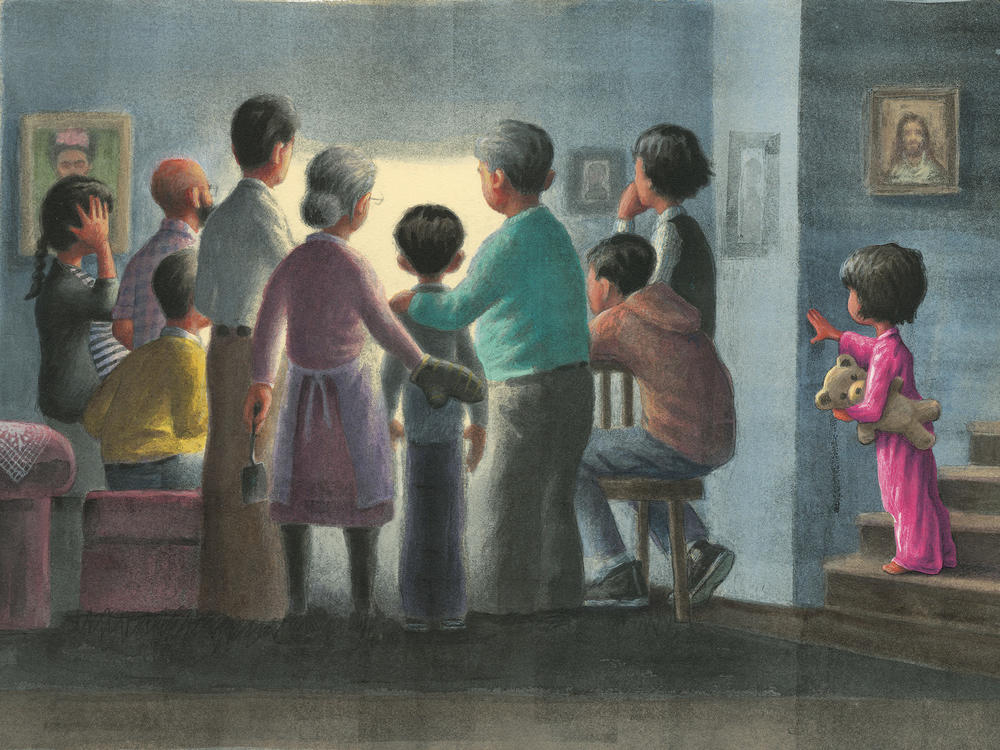Section Branding
Header Content
Struggling To Discuss Tough Topics With A Kid? Here Are Books That Might Help
Primary Content
If you feel daunted by the responsibility of shepherding a child through difficult times, don't feel alone: "I'm afraid of those moments as a parent, too," says picture book author Matt de la Peña.
Transcript
AUDIE CORNISH, HOST:
There are only so many ways you can say the same thing. But to borrow from a popular kid's book, 2020 was a terrible, horrible, no good, very bad year. And if you're the parent of a young child, one of the year's hardest jobs was trying to explain what was going on in a way that didn't make things worse. And if you thought to reach for a book to help, we've got some suggestions. Author Matt de la Pena is here to talk more about books to share with kids during tough times.
Welcome to the program. Welcome back.
MATT DE LA PENA: Thank you so much for having me again.
CORNISH: Now, I think people might best know your work in the realm of picture books, and some of that is what we're going to be talking about here. But to start, what are the qualities that you look for in a book that will confront difficult subjects for kids or bring some measure of comfort?
DE LA PENA: You know, while you and I read the news, our young children are watching and reading us. And so they're not getting the whole picture, so I like books that hit everything slant. It's not going to hit it head-on, but there are deep issues that we can explore with our children through books because I'll tell you, Audie, the way I look at books, especially books for young people, is they are really just vehicles to conversation. Sometimes, those are silly conversations. Sometimes, they're educational conversations. And sometimes, like now, they can be quite profound.
CORNISH: A big idea for little people is anxiety. Adults deal with it. Some of us just barely reckon with it, frankly (laughter).
DE LA PENA: Yes.
CORNISH: But you've brought a book that talks about it in a way that young people can understand, and it's called "There Might Be Lobsters."
DE LA PENA: Yes.
CORNISH: Who's it by? What's it about?
DE LA PENA: So it's by Carolyn Crimi, and it's illustrated by Laurel Molk. So this is a very simple story about a young dog that is very anxious about going to the beach. And the companion of the dog, Eleanor - she doesn't understand why this dog is so scared. But the dog is worried about the sand, the beach balls. But especially, the little dog is scared of lobsters. What I love about this book is we see a dog who is pushed out of her comfort zone. She ends up losing her little stuffed animal because a wave takes it out to sea, so the dog is forced out of her comfort zone. She goes into the water. She saves Chunka Munka - that's the stuffed animal's name - and brings it back to shore. And I think it's great to read today with kids because so many of us are forced out of our comfort zones. So I just - I love the way it's exploring that.
CORNISH: With the number of deaths in this country, it's very likely that you have kids who have lost a neighbor, a friend, a family member to COVID-19. And death more broadly isn't unusual in terms of themes for kids' books. I mean, you've talked about this on the show in the past. What do the best of those kinds of books have in common in the way they approach it?
DE LA PENA: So "A Map Into The World" by Kao Kalia Yang, illustrated by Seo Kim - a little girl who's peering through the window at a neighbor who's lost his wife of 60 years. And she can't quite access what it means, but it weighs on her. And it weighs on the entire street. And near the end of the book, I love this moment where she goes across the street with a bucket of chalk, and she asks if she can draw on his sidewalk. And she draws him a map into the world because she thinks he might need a map in order to get back into the world.
CORNISH: You've written a book that does what we're talking about here. It's called "Love." It came out in 2018, and there - I have this book in my house, and there are various scenes in it of children confronting kind of happy and dark moments that represent love. And it struck me that you had couched all of these moments, some of them quite fearful, in the context of love and protection.
DE LA PENA: As I was writing "Love," at first, my idea was to just tell a very reinforcing story because I wanted a story that I could read to my daughter before bed that would make her feel good, considering that the news wasn't always so positive. And I wanted to feel good about something. But as I was writing it, and in thinking of the books I'm presenting to you all today, I just - something didn't feel true or honest about a book that was purely reinforcing. Now, I want to acknowledge there are some great books that do that. But for the book I was writing, I had to at least acknowledge adversity because every child is going to be confronted with adversities throughout their life. So I wanted to acknowledge that by having a couple challenging scenes.
CORNISH: And we should say they don't get solved, right?
DE LA PENA: Yes.
CORNISH: Some of these are - page by page is an image, is a scene, and it works on both levels as a parent because you recognize your person - yourself in the image. And for the kid, you know, I assume, like, it's, for them, seeing themselves in the image of being the outsider. But I remember thinking, this is kind of dark (laughter) some of these pages. And, like, I'm actually afraid of these moments. I'm afraid of when these moments come, and I'm going to have to somehow explain.
DE LA PENA: And, you know, I'm afraid of those moments as a parent too. I don't think the job of a picture book is to answer questions. I think it's just to explore interesting topics, and I hope that's what these books do. And I hope that's what my books do.
CORNISH: Author Matt de la Pena - his newest book, out in February, is his third collaboration with illustrator Christian Robinson. It's called "Milo Imagines The World".
Thank you for being with us.
DE LA PENA: Thank you very much.
(SOUNDBITE OF MUSIC) Transcript provided by NPR, Copyright NPR.
Bottom Content




